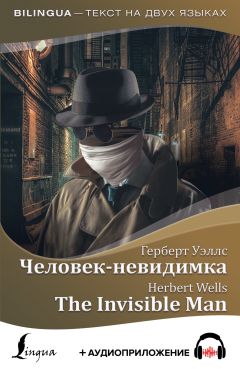Текст книги "Человек-невидимка / The Invisible Man + аудиоприложение"

Автор книги: Герберт Уэллс
Жанр: Иностранные языки, Наука и Образование
Возрастные ограничения: +12
сообщить о неприемлемом содержимом
Текущая страница: 5 (всего у книги 15 страниц) [доступный отрывок для чтения: 5 страниц]
Chapter XVIII
The Invisible Man Sleeps
The Invisible Man examined the two windows of the bedroom. Outside the night was very quiet and still. Then he examined the keys of the bedroom and the two dressing-room doors. Finally he expressed himself satisfied. He stood on the hearth rug and Kemp heard the sound of a yawn.
“I’m sorry,” said the Invisible Man, “if I cannot tell you all that I have done tonight. But I am tired. It’s horrible! But believe me, Kemp, it is quite a possible thing. I have made a discovery. I meant to keep it to myself. I can’t. I must have a partner. And you… We can do such things… And tomorrow… Now, Kemp, I must sleep or perish.”
Kemp stood in the middle of the room staring at the headless garment.
“I suppose I must leave you,” he said. “It’s incredible. But it’s real! Is there anything more that I can do for you?”
“Only bid me good-night,” said Griffin.
“Good-night,” said Kemp, and shook an invisible hand. He walked to the door. Suddenly the dressing-gown walked quickly towards him.
“Remember!” said the dressing-gown. “No attempts to hamper me, or capture me! Or-”
Kemp’s face changed a little. He closed the door softly behind him, and the key was turned upon him forthwith.
“Am I dreaming? Has the world gone mad-or have I?”
He laughed, and put his hand to the locked door.
“Barred out of my own bedroom!” he said.
He stared at the locked doors.
“It’s a fact,” he said. “Undeniable fact! But-”
He shook his head hopelessly, turned, and went downstairs.
He lit the dining-room lamp, got out a cigar, and began pacing the room. He began to talk to himself.
“Invisible! Is there such a thing as an invisible animal? In the sea, yes. Thousands, millions. All the microscopic things, the jelly-fish. In the sea there are more things invisible than visible! I have never thought of that before. But in air? No! It can’t be. But after all-why not? If a man was made of glass he would still be visible.”
He walked out of the room, and went into his little room and lit the gas there. It was a little room, and in it were the newspapers. The morning’s paper lay carelessly opened and thrown aside. He took it, turned it over, and read the “Strange Story from Iping”. Kemp read it swiftly.
“Disguised!” said Kemp. “Hiding! No one knows about his misfortune. What does he want?”
He dropped the paper.
“Ah!” he said. “Now we shall know the truth.”
He opened the paper. “An Entire Village in Sussex Went Mad” was the heading.
“Good Heavens!” said Kemp.
He read it. Then he dropped the paper and stared blankly in front of him. He caught up the papers again, and reread the articles.
“But where did the tramp come from? Why the devil was he chasing a tramp?”
He sat down.
“He’s not only invisible,” he said, “but he’s mad! Homicidal mania!”
When dawn came, Kemp was still pacing up and down, trying to grasp the incredible. He was too excited to sleep. His servants discovered him, and were inclined to think that he had studied too much. He gave them extraordinary instructions to lay breakfast for two-and then to confine themselves to the basement. Then he continued to pace the dining-room until the morning’s paper came. The happenings at the “Jolly Cricketers” were discussed, and the name of Marvel was mentioned. But Mr. Marvel had not said anything about the three books, or the money.
Kemp sent his housemaid out to buy all the morning papers.
“He is invisible!” he said. “And his rage is growing to mania! He may do terrible things! And he’s upstairs. What ought I to do? Will it be a treachery if I-? No.”
He went to a little desk in the corner, and began to write a note. Then he took an envelope and addressed it to “Colonel Adye, Port Burdock.”
The Invisible Man awoke as Kemp was doing this. He awoke in an evil temper, and Kemp heard his feet rush suddenly across the bedroom overhead. Then a chair was flung over and the glass was smashed. Kemp hurried upstairs and rapped.
Chapter XIX
Certain First Principles
“What’s the matter?” asked Kemp, when the Invisible Man admitted him.
“Nothing,” was the answer.
“But, the smash?”
“Just irritability,” said the Invisible Man. “I forgot my arm; and it hurts.”
“You’re rather liable to that sort of thing.”
“I am.”
Kemp walked across the room and picked up the fragments of broken glass.
“The papers write about you,” said Kemp, standing up with the glass in his hand; “about that happened in Iping, and down the hill. The world has become aware of its invisible citizen. But no one knows you are here.”
The Invisible Man swore.
“The secret’s out. I don’t know what your plans are, but of course I’m ready to help you.”
The Invisible Man sat down on the bed.
“There’s breakfast upstairs,” said Kemp, speaking as easily as possible. Kemp led the way up the narrow staircase to the belvedere.
“Before we can do anything else,” said Kemp, “I must understand a little more about this invisibility of yours.”
He had sat down, after one nervous glance out of the window. His doubts vanished as he looked across to where Griffin sat at the breakfast-table, a headless, handless dressing-gown, wiping unseen lips on a miraculously held serviette.
“It’s simple enough-and credible enough,” said Griffin, putting the serviette aside and leaning the invisible head on an invisible hand.
“No doubt, to you, but-” Kemp laughed.
“Well, yes; to me it seemed wonderful at first, no doubt. But now, great God!.. But we will do great things yet! This idea came to me first at Chesilstowe.”
“Chesilstowe?”
“I went there after I left London. You know I dropped medicine and took up physics? Well, I did. Light fascinated me.”
“Ah!”
“Optical density! The whole subject is a network of riddles. I was two-and-twenty and full of enthusiasm, and I said, ‘I will devote my life to this.’ You know what fools we are at two-and-twenty?”
“Fools then or fools now,” said Kemp.
“I began to work-like a slave. And I had hardly worked and thought about the matter six months before light came suddenly! I found a general principle of pigments and refraction-a formula, a geometrical expression involving four dimensions. Fools, common men, even common mathematicians, do not know anything of what some general expression may mean to the student of molecular physics. In the books-the books that tramp has hidden-there are marvels, miracles! But this was not a method, it was an idea, that might lead to a method by which it would be possible, without changing any other property of matter to lower the refractive index of a substance, solid or liquid.”
“Phew!” said Kemp. “That’s interesting! But still I don’t see quite… I can understand that thereby you could spoil a valuable stone, but personal invisibility was far.”
“Precisely,” said Griffin. “But consider, visibility depends on the action of the visible bodies on light. Either a body absorbs light, or it reflects or refracts it, or does all these things. If it neither reflects nor refracts nor absorbs light, it cannot be visible. You see a red box, for instance, because the colour absorbs some of the light and reflects the rest, all the red part of the light, to you. If it did not absorb any particular part of the light, but reflected it all, then it would be a shining white box. Do you understand? Some kinds of glass would be more visible than others. A box of very thin common glass would be hard to see in a bad light, because it would absorb hardly any light and refract and reflect very little. And if you put a sheet of common glass in water, it would vanish, because light passing from water to glass is only slightly refracted or reflected. It is almost as invisible as coal gas or hydrogen is in air. And for precisely the same reason!”
“Yes,” said Kemp, “that is clear.”
“And here is another fact you can’t deny. If a sheet of glass is smashed, Kemp, and beaten into a powder, it becomes much more visible while it is in the air; it becomes at last an opaque white powder. If the white powdered glass is put into water, it forthwith vanishes. The powdered glass and water have much the same refractive index!”
“Yes, yes,” said Kemp. “But a man is not powdered glass!”
“No,” said Griffin. “He’s more transparent!”
“Nonsense!”
“That from a doctor! Have you already forgotten your physics, in ten years? Just think of all the things that are transparent and seem not to be so. Paper, for instance, is made up of transparent fibres, and it is white and opaque only for the same reason that a powder of glass is white and opaque. And not only paper, but cotton fibre, linen fibre, wool fibre, woody fibre, and bone, Kemp, flesh, hair, nails and nerves, in fact, the whole fabric of a man except the red of his blood and the black pigment of hair, are all made up of transparent, colourless tissue. Most fibres of a living creature are no more opaque than water.”
“Great Heavens!” cried Kemp. “Of course, of course! I was thinking only last night of the sea larvae and jelly-fish!”
“Now you understand me! And all that I knew and had in mind a year after I left London-six years ago. Oliver, my professor, was a scientific bounder, a journalist by instinct, a thief of ideas-he was always prying! And you know the knavish system of the scientific world. I simply would not publish, and let him share my credit. I went on working; I got nearer and nearer making my formula into an experiment, a reality. I told no living soul, because I wanted to become famous. And suddenly, by accident, I made a discovery in physiology.”
“Yes?”
“You know the red colouring matter of blood; it can be made white-colourless-and remain with all the functions it has now!”
Kemp gave a cry of incredulous amazement.
The Invisible Man rose and began pacing the little study.
“I remember that night. It was late at night-in the daytime one was bothered with silly students-and I worked then sometimes till dawn. It came suddenly, splendid and complete in my mind. I was alone; the laboratory was still. In all my great moments I have been alone. ‘One can make an animal-a tissue-transparent! One can make it invisible! All except the pigments-I can be invisible!’ I said. It was overwhelming. I stared out of the great window at the stars. ‘I can be invisible!’ I repeated.
And had a magnificent vision of all that invisibility might give to a man-the mystery, the power, the freedom. Just think! And I, poor young man, teaching fools in a provincial college, may suddenly become… And I worked three years: a provincial professor, always prying, silly students! And after three years of secrecy, I found that to complete it was impossible.”
“Why?” asked Kemp.
“Money,” said the Invisible Man, and went again to stare out of the window.
He turned around abruptly.
“So I robbed my old father. The money was not his, and he shot himself.”
Chapter XX
At the House in Great Portland Street
For a moment Kemp sat in silence, staring at the back of the headless figure at the window. Then he started, rose, and took the Invisible Man’s arm.
“You are tired,” he said, “Have my chair.”
He placed himself between Griffin and the nearest window.
Griffin sat silent, and then he resumed abruptly:
“I had left the Chesilstowe cottage already, when that happened. It was last December. I had taken a room in London, a large unfurnished room in a house near Great Portland Street. The room was soon full of the instruments I had bought with my father’s money; the work was going on successfully. I went to bury my father. I remember the funeral, the cheap hearse, the scant ceremony, and the old college friend of his who read the service over him-a shabby, black old man. I remember walking back to the empty house, through the place that had once been a village. I remember myself as a gaunt black figure, and the strange sense of detachment I felt. I did not feel sorry for my father. He seemed to me to be the victim of his own foolish sentimentality. But going along the High Street, my old life came back to me, for I met the girl I had known ten years since. Our eyes met. Something moved me to talk to her. She was a very ordinary person.
Re-entering my room seemed like the recovery of reality. There were the things I knew and loved. I will tell you, Kemp, sooner or later, all the complicated processes. We need not talk about that now. For the most part, they are written in those books that tramp has hidden. We must get those books again.
My first experiment was with a bit of white wool fabric. It was the strangest thing in the world to watch it fade like a wreath of smoke and vanish.
I could scarcely believe I had done it. I put my hand into the emptiness, and there was the thing as solid as ever. I threw it on the floor. I had a little trouble finding it again.
And then came a curious experience. I heard a miaow behind me, and turning, saw a lean white cat, very dirty, outside the window. A thought came into my head. ‘Everything is ready for you,’ I said, and went to the window, opened it, and called softly. The cat came in, purring-the poor beast was starving-and I gave her some milk. All my food was in a cupboard in the corner of the room. The invisible rag upset the cat! But I gave the cat some butter.”
“And you-?”
“Yes. But the process failed.”
“Failed!”
“I gave the beast opium, and put the cat and the pillow it was sleeping on, on the apparatus. And after all the rest had faded and vanished, there remained two little eyes.”
“Interesting!”
“I can’t explain it. The cat was bandaged and clamped, of course; but it woke and miaowed dismally, and someone came knocking. It was an old woman from downstairs, who suspected me of vivisecting. ‘Did I hear a cat?’ she asked. ‘My cat?’ ‘Not here,’ said I, very politely. She was a little doubtful and tried to peer into the room. Bare walls, uncurtained windows, the gas engine, and two radiant points. She was satisfied at last and went away again.”
“How long did it take?” asked Kemp.
“Three or four hours-the cat. I stopped the gas engine, set the cat free and left it sleeping on the invisible pillow and went to bed. I found it hard to sleep. About two o’clock, the cat began miaowing. I tried to hush it by talking to it, and then I decided to drive it away. I remember the shock I had when there were just the round eyes shining green-and nothing round them. I wanted to give it milk, but I hadn’t any. The cat just sat down and miaowed at the door. I tried to catch it, but it vanished. Then it began miaowing in different parts of the room. At last I opened the window. I suppose it went out at last. I never saw the cat any more.
Then-Heaven knows why-I began to think of my father’s funeral again. After that I wandered out into the morning streets.”
“So the invisible cat walks in the city!” said Kemp.
“If it hasn’t been killed,” said the Invisible Man. “Why not?”
“Why not, indeed,” said Kemp.
“It’s very probably been killed,” said the Invisible Man. “It was alive four days after, I know, because I saw a crowd, trying to see whence the miaowing came.”
He was silent again. Then he resumed abruptly:
“I remember that morning before the change very vividly. It was a sunny day in January-one of those sunny, frosty days that came before the snow this year. I was apathetic, and I tried in vain to recover the enthusiasm of my first inquiries. But the fixed idea still ruled me. I tried to think of all the fantastic advantages an invisible man could have in the world.
And there was someone rapping at the door. It was my landlord with threats and inquiries, an old Polish Jew in a long grey coat. I had been tormenting a cat in the night, he was sure-the old woman told him already. He insisted on knowing all about it. The laws in this country against vivisection were very severe. I denied everything. He came into the room, peering about over his spectacles, and a sudden idea came into my mind. He might learn something of my secret! He began to ask. What was I doing? Why was I always alone and secretive? Was it legal? Was it dangerous? I told him to get out. He began to protest. In a moment I threw him out. I slammed and locked the door and sat down quivering.
I became very angry and active. I hurried out with my three books of notes, my cheque-book-the tramp has them now-and directed them from the nearest Post Office to a house of call for letters and parcels in Great Portland Street. I tried to go in noiselessly. Coming in, I found my landlord going quietly upstairs. You would have laughed to see him jump aside! He glared at me as I went by him, and I set to work.
It was all done that night. While I was still sitting and working, there came a repeated knocking at the door. It ceased, footsteps went away and returned, and the knocking was resumed. There was an attempt to push something under the door-a blue paper. I rose and went and flung the door wide open. ‘What do you want?’ said I.
It was my landlord. He lifted his eyes to my face. For a moment he gaped. Then he cried, dropped candle, and went down the dark passage to the stairs. I shut the door, locked it, and went to the looking-glass. Then I understood his terror… My face was white-like white stone.
But it was all horrible. A night of racking anguish, sickness and fainting. Luckily I lived alone.
There were times when I sobbed and groaned.
Then the pain had passed. I thought I was killing myself and I did not care. I shall never forget that dawn, and the strange horror of seeing that my hands had become as glass, and watching them grow clearer and thinner. My limbs became glassy, the bones and arteries faded, vanished. I stood up. I was weak and very hungry. I went and stared at nothing in my looking-glass. By a frantic effort of will I dragged myself back to the apparatus and completed the process. Then I went to sleep.
About midday I was awakened by a knocking. My strength had returned. I sat up and listened and heard a whispering. I sprang to my feet and began to detach the connections of my apparatus. I opened the window. As the window opened, a heavy crash came at the door. Someone was trying to smash the lock. I began to tremble.
Heavy blows began to rain upon the door. I stepped out of the window, and sat down on the roof, secure and invisible. They opened the door and stood in the doorway. It was the landlord and his two step-sons. Behind them was the old witch from downstairs.
You may imagine their astonishment to find the room empty. One of the younger men rushed to the window at once, flung it up and stared out. He stared right through me. So did the others as they joined him. The old man went and peered under the bed. A feeling of extraordinary elation took the place of my anger as I sat outside the window and watched these four people. They were trying to understand the riddle of my behaviour.
The old man agreed with the old lady that I was a vivisectionist. The sons protested that I was an electrician.
I came into the room again and went softly downstairs. I went into one of the sitting-rooms and waited until they came down. Then I slipped up again with a box of matches, fired my papers and rubbish, and left the room for the last time.”
“You fired the house!” exclaimed Kemp.
“Yes, I fired the house. I was invisible, and I was only just beginning to realise the extraordinary advantage my invisibility gave me!”
Chapter XXI
In Oxford Street
“In going downstairs the first time I found an unexpected difficulty because I could not see my feet; indeed I stumbled twice. By not looking down, however, I managed to walk passably well.
I was excited. I felt as a seeing man in a city of the blind. I wanted to jest, to startle people, to clap men on the back. But when I had come to Great Portland Street, I was hit violently behind, and turning saw a man carrying a basket of soda-water syphons. I laughed aloud. ‘The devil’s in the basket,’ I said, and suddenly twisted it out of his hand. But a stupid cabman rushed there, and his fingers took me under the ear. I hurried straight across the road, which was happily clear.
But while walking I was sometimes bruised severely. It was a bright day in January and I was naked and the thin slime of mud covered the road was freezing. Then suddenly a bright idea came into my head. I got into the cab. And so, shivering, scared, and sniffing, and with the bruises, I drove slowly along Oxford Street. This invisibility indeed!
I was cruelly chilled, and a little white dog began to follow me. I had never realised it before, but the nose for a dog is the eye for a man. Dogs perceive the scent of a man moving. This brute began barking and leaping. I went away from the dog very fast.
Then I heard some music, and looking along the street saw the crowd. The people were chanting in the roadway and scoffing on the pavement. I ran up the white steps of a house facing the museum, and stood there until the crowd had passed.
Two urchins stopped by me.
‘Do you see them?’ said one.
‘See what?’ said the other.
‘The footmarks-bare.’
I looked down and saw the youngsters had stopped and were gaping at the muddy footmarks I had left behind me up the newly whitened steps.
‘Somebody went up the steps,’ said the boy.
‘And he did not come down again. And his foot was bleeding.’
For a moment I was paralysed.
‘It’s a ghost,’ said the elder.
He outstretched his hand. In another moment he would touch me! Then I saw what to do. I made a step, and with a rapid movement I swung myself over into the portico of the next house. But the smaller was shouting out that the feet had gone over the wall.
They rushed round and saw my new footmarks on the lower step and upon the pavement.
‘What’s up?’ asked someone.
‘Feet! Look! Feet are running!’
I rushed headlong, with six or seven astonished people following my footmarks. There was no time for explanation. Twice I doubled round corners, thrice I crossed the road, and then, as my feet grew hot and dry, the footmarks began to fade.
This running warmed me to a certain extent. But my back had now become very stiff and sore, my tonsils were painful, and the skin of my neck had been scratched. I had caught a cold, and was sneezing. And every dog was a terror to me.
Then I saw a mass of black smoke streaming up above the roofs and telephone wires. It was my lodging burning; my clothes, my apparatus, all my resources, except my cheque-book and the three volumes of memoranda that awaited me in Great Portland Street, were there. Burning! I had burnt my boats!”
The Invisible Man paused and thought. Kemp glanced nervously out of the window.
“Yes?” he said. “Go on.”
Внимание! Это не конец книги.
Если начало книги вам понравилось, то полную версию можно приобрести у нашего партнёра - распространителя легального контента. Поддержите автора!Правообладателям!
Данное произведение размещено по согласованию с ООО "ЛитРес" (20% исходного текста). Если размещение книги нарушает чьи-либо права, то сообщите об этом.Читателям!
Оплатили, но не знаете что делать дальше?








































